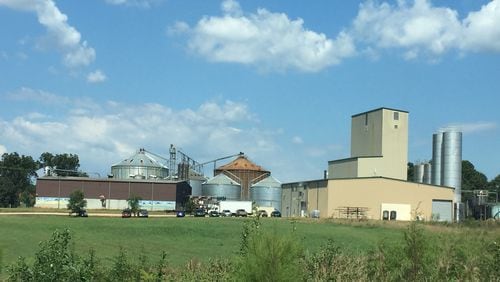When it needed a loan, Hart AgStrong, a grain processor partly owned by Republican gubernatorial candidate Brian Kemp, put up as collateral thousands of bushels of canola and sunflower seeds. The problem was, AgStrong didn't own them.
Later, AgStrong used an insurance settlement from two fires at its plant in northeast Georgia to pay the same lender — not the farmers whose grain had been destroyed.
The company’s actions “may be a felony under Georgia law,” an attorney for the state Department of Agriculture wrote to AgStrong in April. The letter threatened to revoke AgStrong’s licenses to do business with Georgia farmers, collect a $70,000 fine, and liquidate the company’s assets to compensate farmers.
“I was heavy-handed,” the attorney, Ashley Sellers, wrote in a separate email to Agriculture Commissioner Gary Black and others on April 10, “but I think the options are clear.”
Six months later, AgStrong is still in business, although its situation seems precarious. It can no longer accept grain from farmers without paying up front. As a result, its inventory is depleted. And it is still trying to repay hundreds of thousands of dollars to farmers in Georgia and other states, as little as $20 at a time. One farmer filed for bankruptcy while waiting for payment from AgStrong. Another said he had to refinance loans to keep his farm afloat.
The Atlanta Journal-Constitution reviewed more than 2,000 pages of Department of Agriculture records on AgStrong. The documents depict a relatively young company experiencing repeated setbacks, some unavoidable, some self-inflicted.
Nothing in the records suggests Kemp was directly involved in AgStrong's questionable business dealings. However, some of those activities occurred while Kemp, the Georgia secretary of state, served on the company's board of directors and while he negotiated to extend another loan that is now the subject of a bitterly contested lawsuit.
His campaign said this week that Kemp had not known the extent of AgStrong’s troubles. He resigned from the company’s board in August of last year.
Regardless, Kemp’s finances remain closely tied to AgStrong’s success. He invested $750,000 in the company a decade ago. More significantly, he guaranteed $10 million in loans to AgStrong — about twice his net worth, according to disclosure statements. The loans begin to mature next year, a few months after Kemp hopes to move into the governor’s office.
Aides to Kemp said AgStrong’s property and equipment back most of those loans. They also said Kemp was not the only investor who promised to pay if the company couldn’t.
In a recent deposition, Kemp professed to know little about AgStrong’s operations. A lawyer asked when he last received financial reports from the company.
“I wouldn’t recall that,” Kemp said. “It’s been a long time.”
It was one of at least 91 times Kemp answered questions with varying constructions of “I don’t know,” “I don’t remember,” or “To the best of my knowledge, I don’t recall.”
‘Over-receipted’
One hundred miles northeast of Atlanta, AgStrong's eight massive grain bins, some as tall as five-story buildings, loom over tiny Bowersville, Georgia, the company's home since 2009.
A video on AgStrong’s website describes Bowersville as a quaint little town in America’s “heartland.” In truth, it’s barely a town at all. A post office, the town hall and a community center fill the only occupied commercial building downtown. Two others are boarded up, as is a former Baptist church down the street.
Less than a mile north on Main Street is AgStrong, a complex of storage bins and processing buildings on farmland that used to belong to the town’s longtime mayor. It emits a distinctive odor as machines crush canola and sunflower seed into oil and meal. The smell insinuates itself into everything: clothes, hair, skin.
But the facility brought 10 jobs and a $5 million investment to Bowersville, aided by government-backed loans and long-term tax breaks. The Department of Agriculture granted AgStrong a grain warehouse license in 2009. The company’s application listed Kemp as one of eight owners.
Along with the license, AgStrong obtained what is known as a receipt book — promissory notes that the company gives farmers when they deliver grain. The company wouldn’t have to pay the farmer until it sells the grain on the commodities market or otherwise processes it into consumer goods.
But state inspectors soon discovered discrepancies between AgStrong’s receipt book and its actual inventory.
In December 2011, according to Department of Agriculture records, had outstanding receipts for about 248,000 bushels of canola seed. But when an inspector measured the bins, they were more than 34,000 bushels short — “over-receipted,” as agriculture officials put it. The company had disposed of about $275,000 in grain without paying the growers.
The inspector ordered AgStrong to either pay farmers or replace the grain within 10 days, according to state records. AgStrong quickly resolved the discrepancy.
But the Department of Agriculture kept documenting similar shortages in 2014 and 2016. Payments to farmers fell behind schedule.
AgStrong always seemed to be putting off one debt to pay another, said Phillip Douglas, a farmer from Kinsey, Alabama, who sold more than $13,000 in sunflower seed to the company.
“I understand that,” Douglas said. “Farmers do that.”
But he said it was AgStrong that convinced him to plant sunflowers as an alternative to cotton. He expected to be paid for what he grew.
“I stuck my neck out and it cost me, big time,” he said. “It hurt me.”
Douglas had to refinance the debt on his farm. All he has gotten from AgStrong is what he called a “dribble-drabble” of small checks. At the mailbox, he said, he might find a check for $1,000 one month, but only $100 or $200 the next. He still hasn’t been paid in full.
‘Farmers owed money’
AgStrong’s problems escalated in the last half of 2016. Two fires — one in July, then another in October — destroyed more than 160,000 bushels of grain. The market value totaled about $1.3 million.
The second fire broke out at a particularly inopportune time: four days before the company was supposed to repay a $500,000 loan from a Toccoa businessman and friend of Kemp’s, Rick Phillips.
Kemp said in his recent deposition that he traveled to Toccoa several times in the fall of 2016 to negotiate with Phillips for an extension. Kemp even gave Phillips a detailed accounting of his personal finances to prove he could cover the loan if AgStrong defaulted. Phillips extended the due date to February 2017.
According to his campaign aides, Kemp did not know when he negotiated with Phillips that AgStrong was about to relinquish its receipt book to the Department of Agriculture, a move that would severely curtail its operations.
A few weeks later, Robert Davis, AgStrong’s chief executive, notified the department that the company had received a settlement from its insurer for the fire losses. Although he said it would take several weeks, “this will place our inventory back in a positive position in Bowersville.”
However, the money didn’t go to farmers, or to buy grain to cover the fire losses, or even to repay Phillips. Instead, the Department of Agriculture later determined, AgStrong paid another creditor, to whom the company had pledged the grain as collateral for a loan.
Davis did not respond to requests for an interview.
After AgStrong didn’t repay him in February, Phillips gave the company three more months. Finally, last October, he filed a lawsuit that seeks to force Kemp or others to pay on the company’s behalf. The case is scheduled to go to trial next month in Gwinnett County Superior Court.
Department of Agriculture officials were also growing frustrated with AgStrong.
“They owe farmers for grain delivered,” Jack Spruill, then the head of the department’s marketing division, wrote to colleagues in late October. “Whether it was crushed and made into oil, floated down the river or burned up is not important to the issues of farmers owed money.”
On Nov. 15, AgStrong and the department signed a consent order that fined the company $70,000 and placed it under close scrutiny by agency officials. The department suspended the fine to give AgStrong time to pay farmers. To monitor payments, the department requires AgStrong to submit copies of every check it writes.
But by early 2018, AgStrong had already violated the consent order. It lost nearly $50,000 in sunflower seed when a bin collapsed, and sold other seed to cover the loss.
At 9:23 a.m. April 11, a department employee hand-delivered a letter to Davis at the AgStrong plant. It gave him 30 days to make good on what the company owed farmers.
The violation, Davis wrote to the department, was “solely a failure on our part,” although he blamed employee turnover for some of the problems.
“Our challenge,” Davis told the department, “is that we have been attempting to continue operations with a negative working capital balance.”
The department ended up giving AgStrong until the end of 2018 to catch up on farmer payments. The agency could have shut the company down, the action it took against a Statesboro cotton warehouse in 1998. In that case, the warehouse owner, David Prosser, pleaded guilty to fraud charges after he used proceeds of cotton sales to invest — badly, it turned out — in cotton futures. Farmers lost $13.5 million, much of which was compensated by federal and state payments. Prosser was sentenced to almost three years in federal prison.
But if the department had closed AgStrong, said Spruill, the agriculture official, “we wouldn’t have had the leverage to get the farmers paid.”
“Get the farmers paid. Get the farmers paid,” Spruill said in an interview. “That was the department’s only motive.”
AgStrong didn’t tell Kemp about either the consent order or the later violation, campaign aides said this week.
In his recent deposition, Kemp said he hadn’t talked to Davis, the chief executive, in “a very, very long time.”
“And,” he said, “I have no knowledge of what the company is doing at the moment.”
OUR REPORTING
The Atlanta Journal-Constitution recently reported on the political and financial perils that Republican Brian Kemp faces from a lawsuit over a loan he personally guaranteed for an agricultural business in which he invested. An earlier story examined Democrat Stacey Abrams’ fundraising for two nonprofit organizations she founded.
About the Author








